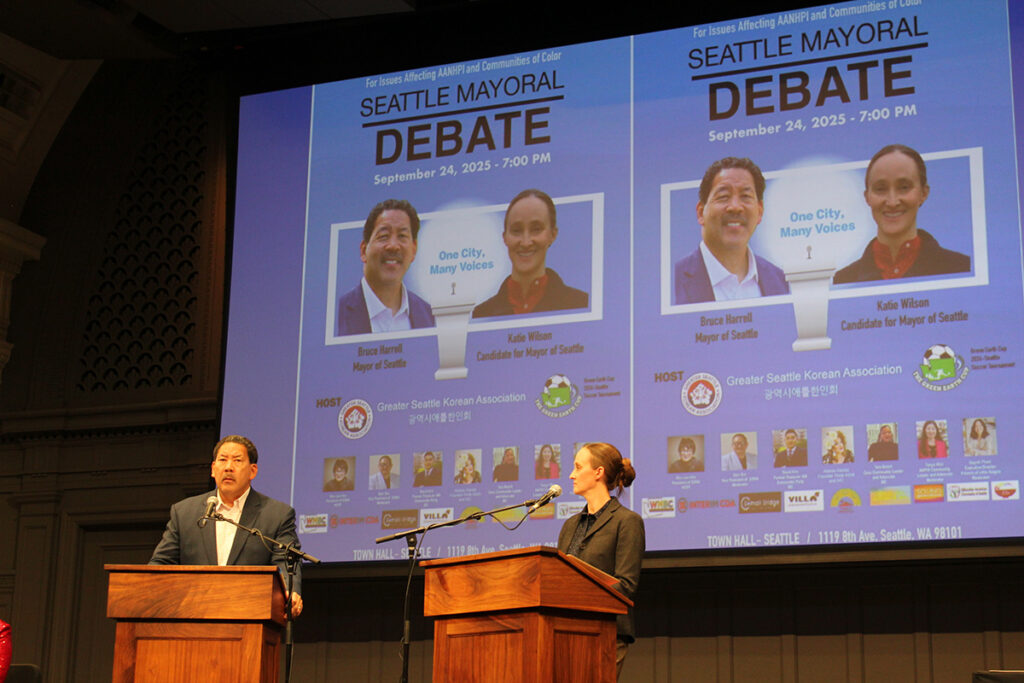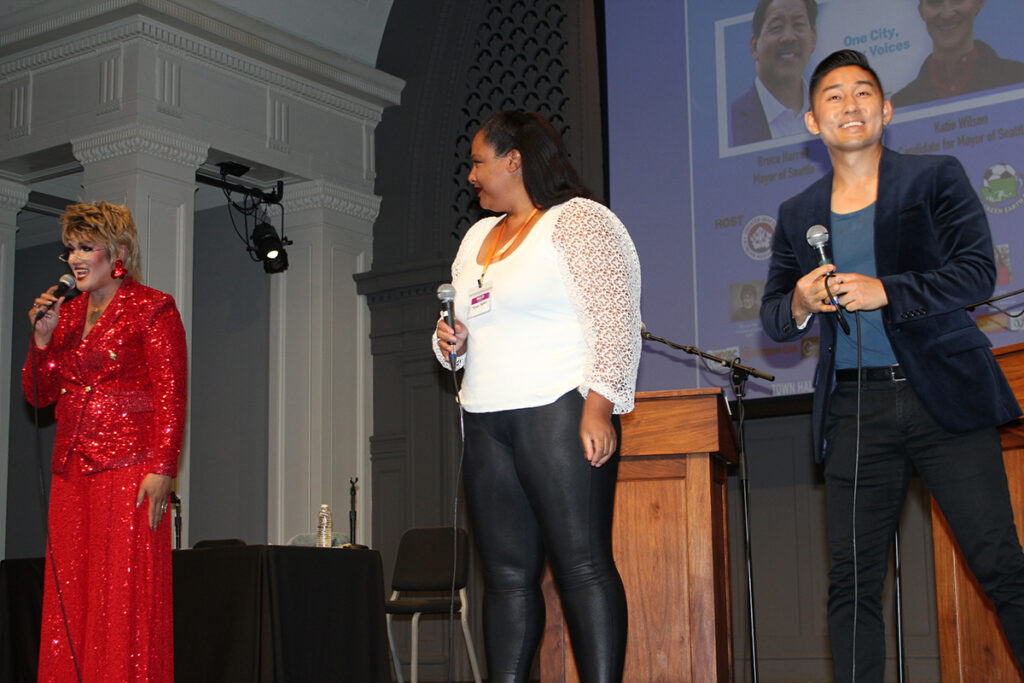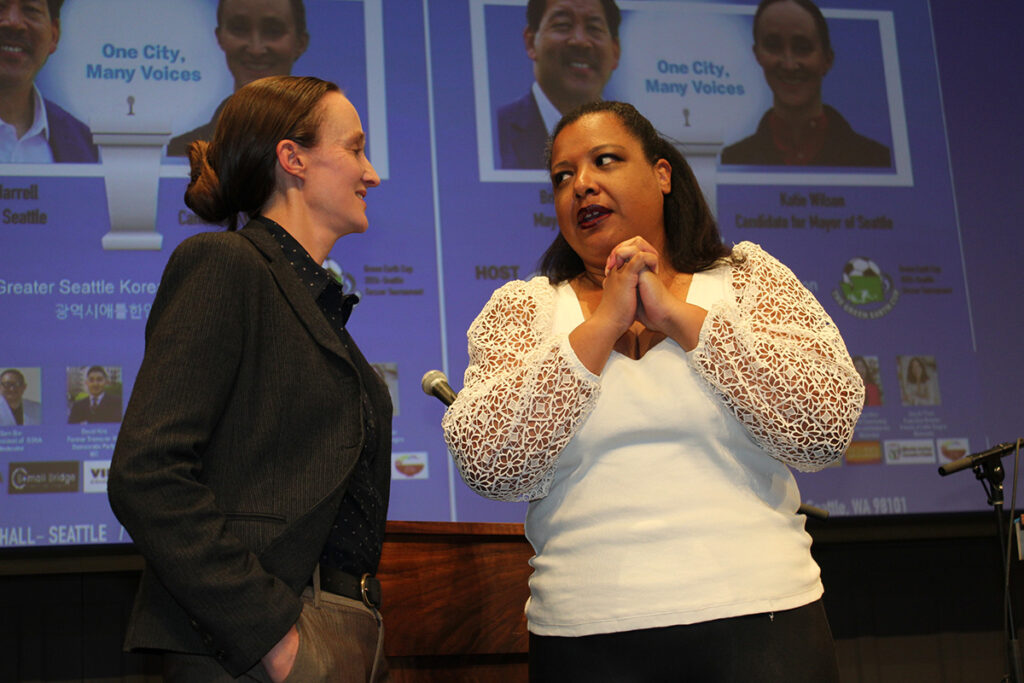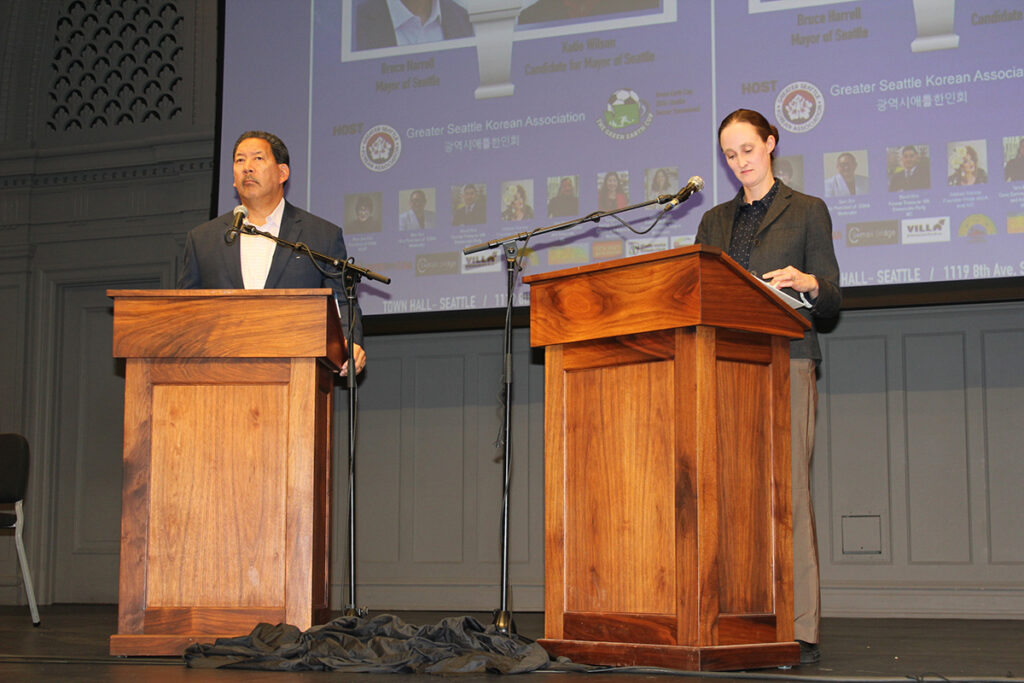By James Tabafunda
NORTHWEST ASIAN WEEKLY

(From left to right): Mayor Bruce Harrell, Katie Wilson
Mayor Bruce Harrell and challenger Katie Wilson presented different visions for Seattle’s next four years as they faced off in a series of debates, with both candidates providing solutions to the city’s most urgent problems—public safety and affordability.
More than 100 residents and business owners gathered at Town Hall Seattle on Sept. 24 for an informative community-oriented debate tailored to the city’s Asian American, Native Hawaiian, and Pacific Islander (AANHPI) communities, especially those in the Chinatown-International District (CID). The forum, hosted by the Greater Seattle Korean Association (GSKA) under the “One City, Many Voices” theme, followed a televised FOX 13 debate the night before.

(From left to right): Debate moderators Sam Sim, Tanya Woo, Quynh Pham

(From left to right): Community leaders Aleksa Manila, Tera Beach, David Kim
Questions came from community leaders David Kim, Tera Beach, and Aleksa Manila, as well as moderators Sam Sim, Tanya Woo, and Quynh Pham.
“This is your opportunity to hear directly from the candidates and to ensure our broader community’s voices are part of shaping the future of the city,” said Wonjun Kim, GSKA president.
Establishing different leadership philosophies
Wilson opened the debate by sharing her two decades of watching the city’s transformation and a career centered on listening and coalition-building. Positioning herself as a candidate who turns constituent voices into bold action, she emphasized “knowing how to bring people and communities together around solutions to the problems they’re facing.”
Harrell framed the election as a choice between experienced, results-driven governance and what he described as ideology, emphasizing his track record of delivering “solid, measurable results” for public safety and affordable housing. He pledged to keep “taking the hits” on behalf of residents affected by rising housing costs and displacement, connecting his college football background to a willingness to confront criticism and disagreement in pursuit of progress.
The debates explore the city’s main concerns, with many residents pressing candidates on their records and demanding evidence of improvement. Attendees submitted questions prior to the debate that kept the focus on homelessness, economic recovery, and representation for marginalized communities.
Improving public safety and combating economic decline in CID
Harrell defended his administration’s “downtown activation plan,” which he described as a community-centered strategy involving street cleaning, case workers on foot patrol, and expanded Safety Ambassadors to de-escalate incidents.
“It’s not a militaristic approach,” Harrell said. “We arrest people who do harm, but we also treat those who need help.” He pointed to targeted efforts at intersections such as 12th Avenue South and South Jackson Street, along with recent investments in crisis care centers and neighborhood services. “My family’s roots are in Chinatown,” Harrell added, saying city investments are “already beginning to stabilize” the district.
Wilson countered by linking current struggles in the CID to decades of disruption—from the construction of I-5 to the struggles over the Kingdome. She called homelessness, especially in Little Saigon, a primary driver of safety concerns.
“Shelter capacity has declined, and more people are now sleeping unsheltered,” Wilson said. “That fuels the very hotspots of violence and illicit activity we see today.” She urged deeper city partnerships with groups such as Friends of Little Saigon and the Business Improvement Area, stressing “root-cause solutions, not quick fixes.”

(From left to right): Katie Wilson, Tera Beach
Battling open-air drug markets
Wilson argued the city must expand addiction treatment, shelter, and permanent housing alongside consistent law enforcement.
“We need more treatment, but also housing and case management to make recovery sustainable,” she said, warning that people return to the streets without long-term support. She backed Law Enforcement Assisted Diversion programs, criticized past funding cuts, and said police should deter crime while partnering with outreach teams. To pay for services, Wilson pledged to prioritize existing resources and push for progressive revenue legislation. “The city can’t do it alone,” she added.
Harrell pointed to measurable results under his administration, citing declines in 911 calls, thefts, and robberies in Little Saigon following targeted police operations. He said multi-agency stings had seized nearly $3 million in illegal drugs and led to 14 arrests, removing substances that “could kill everyone in Seattle twice.” Harrell stressed coupling enforcement with outreach, noting increased housing placements and hundreds of engagements with vulnerable residents. “Doing the hard work to shelter and treat people,” he said, “is what delivers real public safety improvements.”
Supporting immigrant and family-owned businesses
Wilson pledged support for small business owners facing rising rents, complex permitting, and high operating costs. She said roundtables with immigrant entrepreneurs revealed that language barriers and bureaucracy often block progress.
“I will commit to continuing to reach out to small businesses around our city and to meet them where they’re at. Not expecting them to come to City Hall,” Wilson said. She promised reforms simplifying permits and licensing for non-English speakers, stronger oversight of commercial leases and insurance costs, and expansion of the city’s Storefront Repair Fund to provide direct recovery grants.
Harrell highlighted programs launched under his administration, including the Storefront Repair Fund and a $5 million loan pool to cover setbacks such as vandalism. He cited the Business Community Ownership Fund, which allows businesses to own their leases, and the Capital Access Program, which he said has supported more than 300 entrepreneurs. Tax reforms, Harrell noted, have delivered breaks for 90% of small and medium-sized businesses while raising rates on global corporations. “We’ve been very aggressive in supporting small business,” Harrell said. “And we’re just getting started.”
Advancing equity for AANHPI communities
Harrell pointed to several programs launched under his administration, including the Liberty Project, developed with Tabor 100, the University of Washington Foster School of Business, and Seattle University. The program aims to expand access to capital, provide technical assistance, and prioritize opportunities for minority-owned businesses in key industries.
“We want our officers to respond to the serious stuff,” Harrell said, linking economic empowerment to culturally competent policing and citing investments in unarmed crisis response as part of a broader equity strategy. He also highlighted expanded storefront recovery funds and city-backed ownership opportunities to help businesses weather rising rents and vandalism.
Emphasizing a different approach, Wilson focused on outreach and accessibility. She urged City Hall to disseminate information about grants and contracts through ethnic and community newspapers like Northwest Asian Weekly and International Examiner. “We have to meet businesses where they are,” Wilson said, stressing the importance of language access and lowering bureaucratic barriers. She argued that inclusive communication and trusted partnerships are critical to building equity in funding and city contracting.
Audience questions on graffiti, safety concerns
Wilson said residents across Seattle share frustrations about a lack of progress.
“It’s definitely what I’ve been hearing as I’ve been talking with people in neighborhoods across the city, from Capitol Hill to Mount Baker,” Wilson said. She argued the city cannot “just arrest our way out of crime, especially low-level crime,” and called for renewed investment in diversion programs such as Law Enforcement Assisted Diversion, which steers offenders to services instead of jail. Wilson also pledged to expand housing with case management so people are not “just cycling back out onto the street.”
Harrell countered with what he called a balanced approach of enforcement, outreach, and creativity. “We’re putting our resources where our values are, to keep this community safe,” Harrell said, citing targeted drug enforcement, community-based programs, police recruitment, and mural projects to replace graffiti with public art.

(From left to right): Mayor Bruce Harrell, Katie Wilson
Closing statements on past record versus future era
Harrell asked debate attendees to judge him by his record, stressing experience and measurable results. “My commitment to serving you has never wavered,” Harrell said. “You elected me to tackle homelessness, expand housing, and restore a sense of safety. I’ve delivered on those results.” He cited more than $1 billion invested in affordable housing and managing $600 million in budget deficits as examples of responsible stewardship.
He then contrasted his executive leadership with challenger Wilson’s activist background. “Experience matters,” he said. “This is a choice between a tested mayor who has rebuilt our public safety infrastructure, and a community activist who just two years ago advocated defunding it.” He closed by linking Seattle’s future to the need for “strong, effective, articulate leadership” amid new national challenges.
In her closing statement, Wilson described her mayoral campaign as a call for change driven by equity and community voices. “I have not spent my career aspiring to hold elected office,” Wilson said. “I decided to run for mayor because I saw that we are in a moment that calls for new ideas and new leadership.” She described herself as “an outsider with an insider’s knowledge of City Hall,” pledging to remain a community organizer if elected. “That means that I am committed to listening, to collaborating, and building a shared vision for Seattle with people across our city,” she said. Citing support from King County Democrats, labor unions, and AANHPI leaders, Wilson vowed to pursue solutions on homelessness, public safety, and equity, urging voters to back “a city government that is responsive and effective.”
For more information on Mayor Bruce Harrell, go to www.bruceforseattle.com. For more information on Katie Wilson, go to www.wilsonforseattle.com.


I was there listening them .
Hopefully who will be new Mayer can improve city of Sesttle safety, better business, reduces homeless and addiction , mental health population.
Living cost lower in Sesttle too.